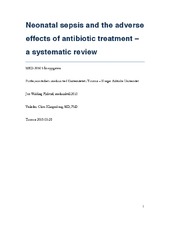Neonatal sepsis and the adverse effect of antibiotic treatment - a systematic review
Permanent lenke
https://hdl.handle.net/10037/8021Dato
2015-05-28Type
Master thesisMastergradsoppgave
Forfatter
Fjalstad, Jon WiddingSammendrag
Abstract
Objective: Antibiotic treatment in the neonatal period can be life-saving, but overuse is frequent. Recently studies have shown adverse effects from neonatal antibiotic treatment. This study aims to systematically review the litterature on the relationship between neonatal antibiotic treatment and changes in gut microbiota, the risk of necrotizing enterocolitis (NEC), and the risk of fungemia.
Methods: We performed a systematic search in the Pubmed, Embase, and Medline databases up to December 2014. We included studies that assessed the effect of neonatal antibiotic treatment on the following outcomes; (1) change in gut microbiota, (2) NEC, and (3) fungemia. Abstracts were considered for eligibility by two researchers.
Results: We included 14 studies in the microbiota category, twelve in the NEC category, and eleven in the fungemia category. The studies used very different designs and often had small study samples. Neonatal antibiotic treatment appeared to decrease gut microbiota diversity and the total bacteriall count, but findings were inconclusive on different bacteria. Neonatal antibiotic treatment, particularly prolonged treatment, appeared to increase the risk of NEC. Antibiotic treatment appeared protective of NEC in sepsis patients. Broad-spectrum antibiotic treatment appeared to increase the risk of fungemia.
Conclusions: Neonatal antibiotic treatment appears to have an effect on gut microbiota, the risk of NEC, and the risk of fungemia. However, the methodological quality was poor in many studies, and more studies, preferably prospective with large study populations, are needed.
Forlag
UiT Norges arktiske universitetUiT The Arctic University of Norway
Metadata
Vis full innførselSamlinger
- Mastergradsoppgaver Helsefak [1337]
Copyright 2015 The Author(s)
Følgende lisensfil er knyttet til denne innførselen:


 English
English norsk
norsk
